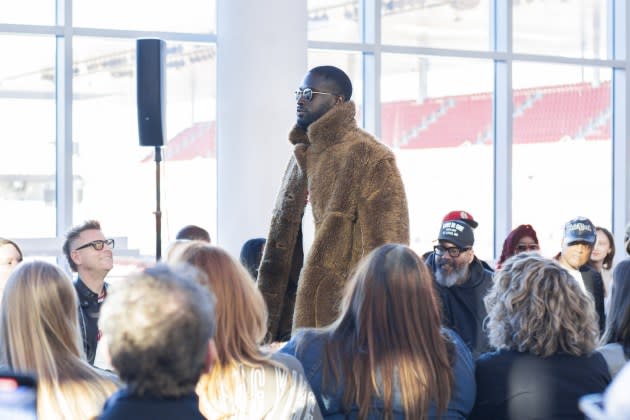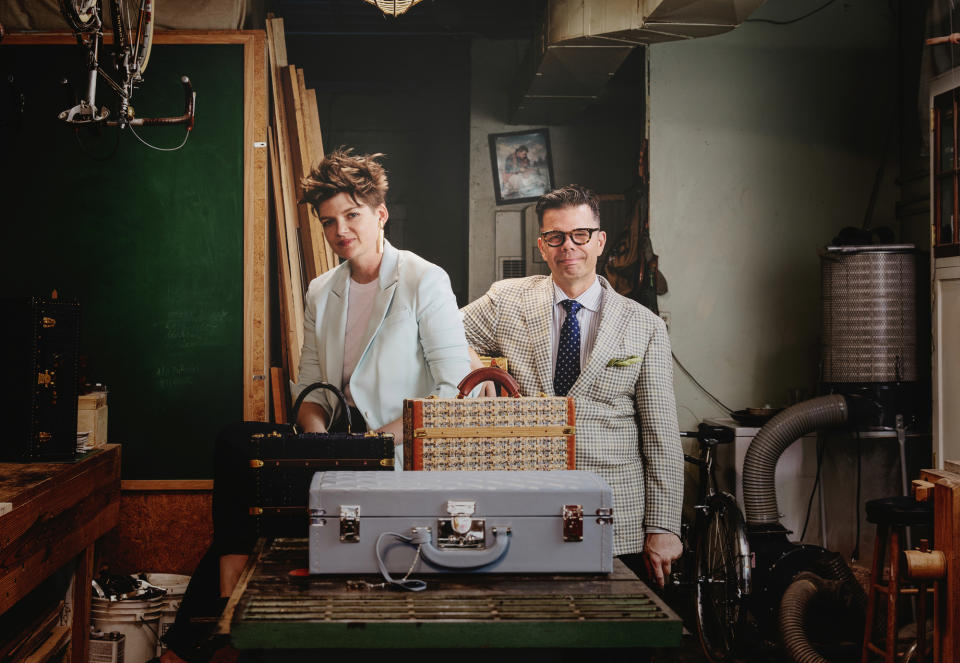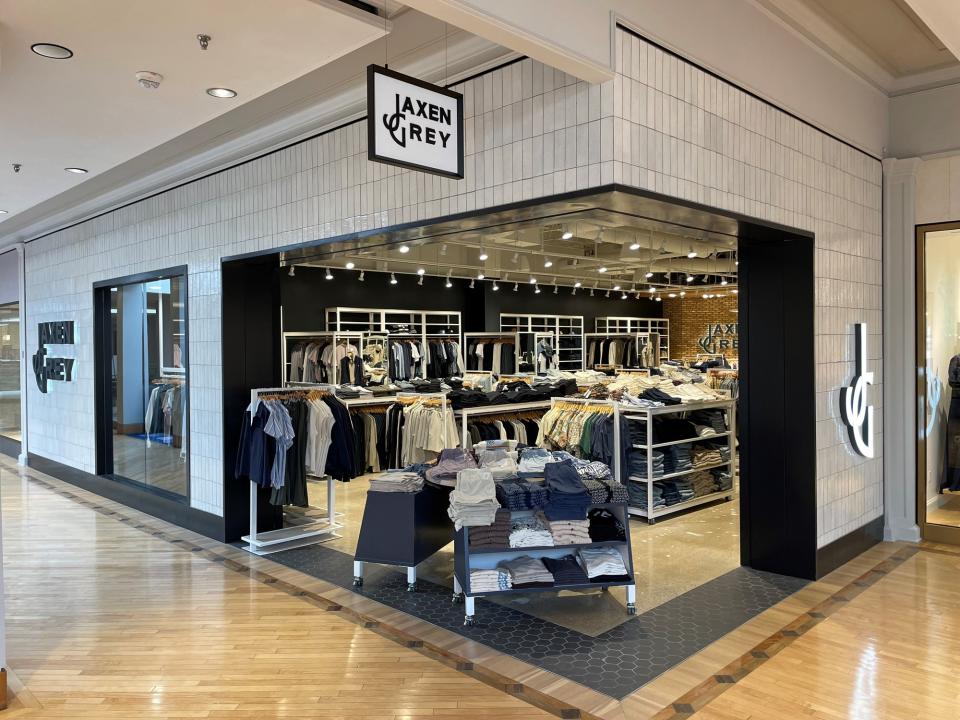Menswear Retailers Drive Sales and the Local Economy in St. Louis

As retailers around the country are striving to strengthen sales by whatever means they can, the St. Louis Fashion Fund gave a boost to eight local menswear stores through its Men’s Retail Day.
An offshoot of “Gent Men’s Fashion Week,” the event was held on Feb. 17 and the SLFF teamed up with Major League Soccer’s St. Louis City SC for a runway show at Citypark. Players like Tim Parker and Aziel Jackson were among the models in the show. Upward of 300 people turned up at the newly opened soccer stadium to get a closer look at the St. Louis-based menswear collections. The homegrown men’s-focused activations benefited local retailers and the St. Louis Fashion Fund.
More from WWD
Fashion is a moneymaker for Missouri, which has more than 3,500 fashion-related businesses that generate $13.3 billion for the state’s economic engine annually and support 86,000-plus jobs. The SLFF has also orchestrated the first state fashion lobby day to be held on March 13. The Missouri Fashion Collective, a consortium of more than 100 fashion executives, designers, educators, entrepreneurs and civic leaders, will descend on the state house in Jefferson City. St. Louis fashion brands will also be featured in a designer showcase, during a luncheon hosted by Lieutenant Governor Mike Kehoe along with Senators Holly Rehder and Tracy McCreery.
Once the second-largest manufacturing hub in the U.S. from the late 19th century until the end of World War II, St. Louis has been trying to regain some of that fashion heritage by fostering young talent and local companies. Men’s Retail Day featured Field Theory, Profield Reserve, Rudimentary, Tufts & Batson, Webster Dry Goods, Ying Ying Ying, Jaxen Grey and Brandin Vaughn.
As a first-time participant in Men’s Retail Day, Field Theory saw “a really nice uptick” in traffic and sales, according to owner Ian VanDam. The outdoor lifestyle retailer offers a few dozen labels including harder-to-find Japanese ones that appeal to hardcore alpinists, snowboarders, campers, runners, fly fishing enthusiasts and more relaxed shoppers alike. Apparel, gear and gifts from a bevy of brands including Bertucci, Big Diamond, Exped, Klättermusen, Hikerkind, Portuguese Flannel, Hyperlite, Tekuno and more are also offered. The best part of Men’s Retail Day was the visibility that it generated “with customers, who weren’t aware of us before the event,” he said.
More than strictly a store, Field Theory periodically offers activities related to mountain sports, climbing, caving and large group expeditions to build a more connected community.
VanDam also founded two other local companies — Truly Floral Spirits and Civil Alchemy — and is committed to strengthening the small business scene. Gabe Batson, who co-owns Tufts & Batson with his wife Amelia Tufts, is another. More than a dozen people dropped by their store on Feb. 17 and mentioned the event, Batson said.
Having started out with fishing rods in 2008, Tufts & Batson added handmade canoes before expanding into steamer trunks, handbags and fragrances two years ago. Apparel will be the next brand extension and a runway show may be held in St. Louis later this year. Steamer trunks with exteriors made of bouclé wool sourced from Linton Tweeds (the same northern England mill that Chanel uses) are spiking sales. Last weekend Tufts & Batson’s $1,500 mini trunk handbags were the bestseller, due partially to St. Louis Fashion Fund’s Susan Sherman toting one around. “As a small company that is just getting started, when we get six or seven people reaching out within a few hours, that’s significant,” Batson said.
Through his association with the St. Louis Fashion Fund, Batson said it’s clear that something is happening in the city. “There is just a lot more excitement. The events are leveling up. I’m seeing a lot more people dressing up and creativity,” he said. “St. Louis is so rootsy. There are a lot of handmade, very creative designers, who are just going for it without abandon.”

As for how other cities might follow St. Louis’ lead, Batson said that having an organized entity is advantageous. “The lesson here is just get on with it. Live out your dreams,” Batson said. “Part of what’s making what’s happening here special is that we’re embracing our uniqueness. There is a lot of civic pride in St. Louis. We’re not trying to be like other cities. We recognize what makes us unique and we’re celebrating that. There are a lot of people who have roots down in St. Louis. They’re not going anywhere. They love it here. They want to invest and be present for it.”
Christopher Loss, owner of Profield Reserve, started his store and clothing label four years ago after working at A Finish Line and creating custom looks for pro athletes like New York Yankee Marcus Stroman and high-level musicians. Having grown up when malls were popping, the 42-year-old designs styles for Profield Reserve that were popular in the ’80s and ’90s — “the coziest of sweatpants” and durable sweaters, he said. All items are designed, sourced and printed in-house. Loss also handles the photography. Particular about the cuts and dyes of each style, Loss said, “We want our garments to age just like something that someone might be trying to find in a thrift store now. I tend to try to create elevated everyday items. I want people to be able to hold onto them for 10, 15 or 20 years. I’m not out here making tons and tons of inventory.”
Shoppers at Profield Reserve typically spend between $25 and $100, he said. A DJ played on Feb. 17 and a brunch pop-up was on hand too. “We had good foot traffic, but we cultivate a space where community pulls up too. I told a lot of people to come through and they came by and had a good time,” Loss said.
Although people are a little tighter with their spending than a year ago, Profield Reserve is trying to find other ways to activate and create new streams of revenue. “As a small business, you have to attack with all of the elements, whether that is food, fashion, drinks or entertainment. We’re cultivating an environment down here that gives people a reason to stick around,” he said. “Business is way different. You have to find a way to get people out of the house and we’re trying to figure that out.”
Having opened the fourth outpost for Jaxen Grey in October, store manager Sean Kraham said about 10 new shoppers stopped by on Men’s Retail Day after seeing an Instagram post from SLFF.

Started in 2019, the multibrand retailer is planning to open a second location in Missouri this year, and one in Madison, Wis., next year. Most shoppers spend between $300 and $400 and many are looking for spring clothing like lightweight button-ups in cottons and linens, Kraham said. “That’s what people are after. They’re going on vacation and they are looking for that warm weather gear,” Kraham said.
Pants, shorts and denim are in demand too, partially due to Jaxen Grey offering inseams from 32 to 36 inches and waistlines from 28 to 42 inches. Lightweight moisture-wicking materials are also popular. Offering customers beer, water, sparkling water, wine and other libations also helps to get people in the door, as does the laid-back casual environment, Kraham said. “But you’re here for a reason — we’re here to style you and get you outside of your comfort zone,” he said.
Jaxen Grey’s main attraction is that customers can get everything in one place — athleticwear, athleisure, loungewear, suits and night-out apparel from about 80 brands including its own along with Vuori, Faherty, Taylor Stitch and Marine Layer.
Best of WWD

